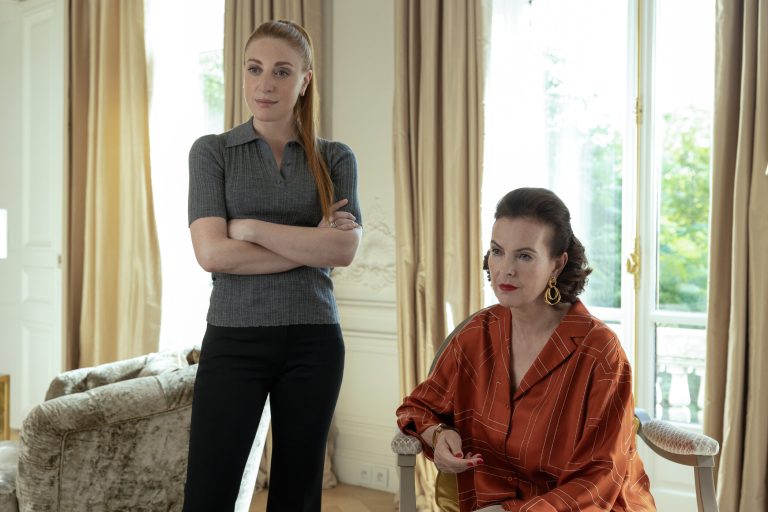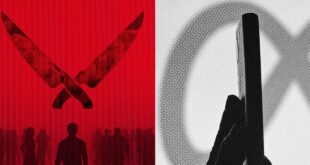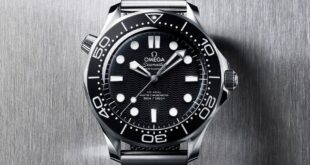Explaining the rules and rituals of fashion to someone like me is about as futile an exercise as trying to pick up anti-matter with a spoon. But give me a soapy TV drama about a high-end French fashion house — led by a family dynasty that’s as dysfunctional as the Roys of Succession — and you have my undivided attention.
That’s because, for all the Parisian glamor and elegance that pervades a show like the new La Maison on Apple TV+, at the crux of it is a corporate power struggle — one in which the progeny of the super-rich are constantly knifing each other in the back. The sort of TV, in other words, that even a fashion rube like me can appreciate.
The struggle in La Maison is for control of a fictional haute couture house, and it’s a prospect that sends a lot of bitchy, glamorous people scrambling for an angle. “Does she know our favorite dish is eating each other alive?” one family member asks another in an early episode.
It could be argued that the success of clothiers and luxury conglomerates in the fashion capital of the world has always rested upon an elusive ideal: The selling of dreams. But La Maison, executive producer Alex Berger explained to me, forgoes that fairy tale for all the stuff you don’t see in the pages of Vogue — like the egos and avarice that rule the industry, and the effect that wanting it all can have on one’s soul.
“Living in Paris, we are surrounded by France’s number one industry: Luxury and fashion,” Berger said. “Like the Murdochs in the media world, we have The Trinity — Hermès, LVMH, and Chanel, complemented by L’Oréal, and their families are very intertwined with their businesses. So, we were able to be inspired by everything that we read and see about these families and their own dysfunctions.”
The cast of La Maison includes Lambert Wilson, who played the Merovingian in The Matrix. Here, he’s Vincent Ledu, the legendary designer of the Ledu fashion house that’s roughly analogous to Chanel. Chief among the Ledu chan’s rivals are the Rovels — the family behind a luxury empire reminiscent of the Arnault family-owned LVMH.


La Maison wastes no time in chumming the waters. Vincent — one of those unyielding artist types for whom commercial imperatives are a niggling distraction — gets caught on tape venting his frustrations in a racist monologue that plunges Ledu into crisis. Clients start pulling orders. An award is rescinded. Vincent is forced to resign (the “stepping down of a king,” that’s what Lambert tells me drew him to the character), while Rovel’s chief executive, the calculating and gimlet-eyed Diane Rovel, moves in for the kill.
Vincent’s defenestration is her chance to vanquish Ledu once and for all. Portrayed in the series by Carole Bouquet — a real-life fashion icon herself and the face of Chanel No. 5 in the 1980s — the imperious Diane is the wealthiest woman in France; she fixates, nevertheless, on what she doesn’t have. “(Diane) wants to get it all — to eat the world,” Bouquet tells me. “She’s that furious and that angry” at life.
When they’re not obsessed with each other, the namesakes of Ledu and Rovel increasingly concern themselves with legacy — more specifically, to whom they’ll hand over the keys to their kingdoms. In a desperate bid to salvage Ledu, meanwhile, Vincent’s right-hand woman Perle Foster (Amira Casar) has brought an edgy young designer into the fold — Paloma Castel, who runs a sort of underground, eco-conscious fashion line in Berlin. She’s everything Vincent is not; young, progressive, a rule-breaker. She also happens to be Vincent’s estranged daughter.
Vincent’s brother Victor is married to Diane’s daughter Caroline — a family defection stemming from a fallout with Vincent (he and Perle also maintain an on-again, off-again affair). And then there’s Robinson, Vincent’s foppish and insecure nephew caught up in Diane’s scheming.

“They have a lot of inadequacies, these characters,” Casar says. “And they’re all in twisted relationships. They’re all shattered inside. All of them. Put together, it’s a very interesting cocktail — it reminds you of a Greek tragedy.”
In fashion, garments require thoughtful construction to support the beauty on the surface; fashion is like architecture in that way, Coco Chanel is said to have remarked. Likewise, the creative team behind La Maison built their show on a foundation of immaculate attention to detail. Actual fashion designers — including a handbag designer who previously worked for Hermès — were brought in to craft everything from original garment linings to logo buckles. The show also slips in cameos by industry figures like Balmain designer Olivier Rousteing and model Eva Herzigova.
In La Maison, family pedigree is as much of an inheritance as the kind that’s measured in euros. Rather than a gilded cage, though, Vincent envisions something different for Paloma. During a tender moment late in the season, he lets her in on a secret — that his maison is as fragile as the lace that’s weaved in its workroom. His implication: That only an all-consuming love of the craft will save Ledu from the nouveau-riche barbarians at the gate.
Source link
 meganwoolsey Home
meganwoolsey Home


